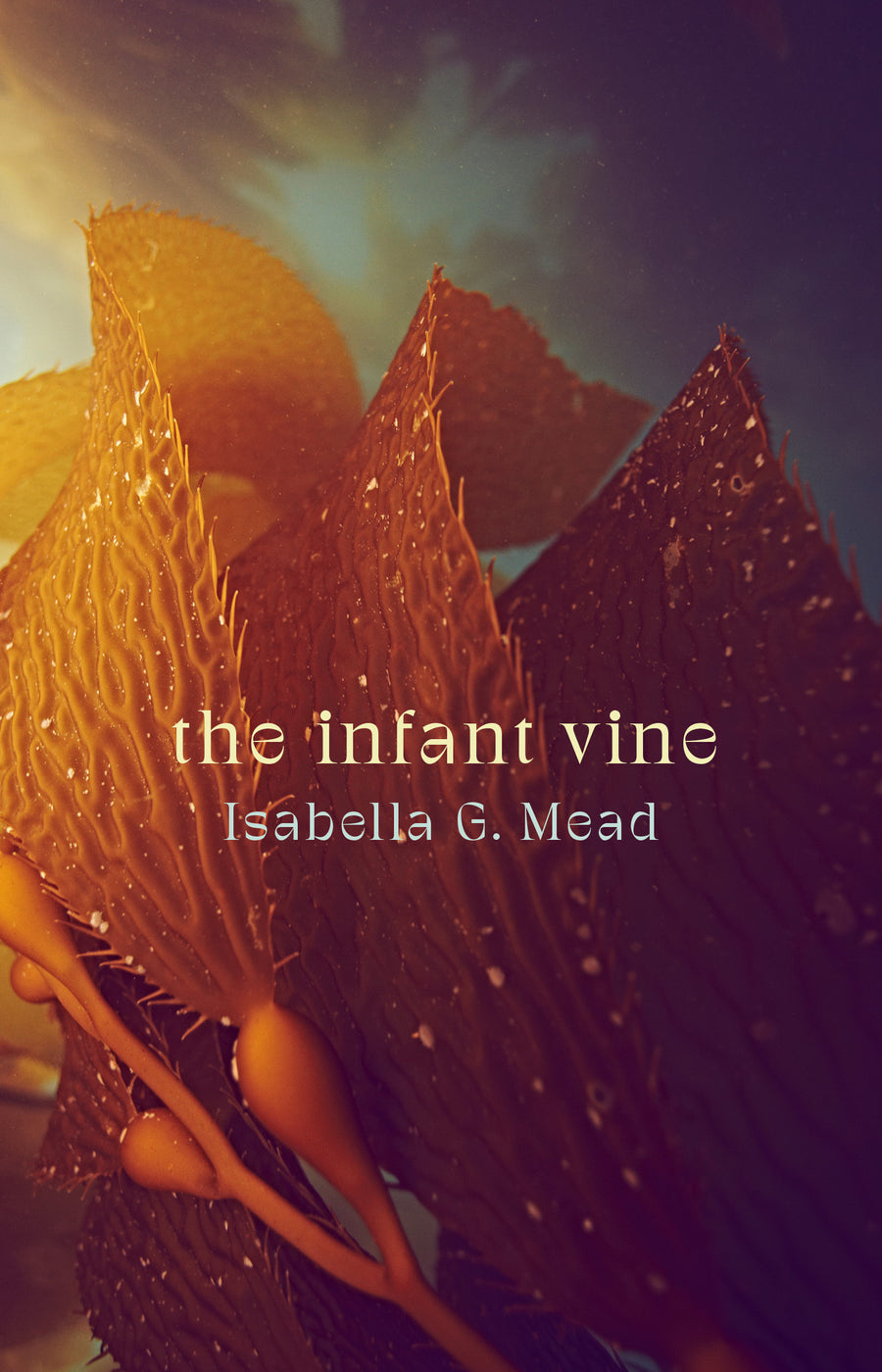 Reviewed by Beatriz Copello
Reviewed by Beatriz Copello
The Infant Vine
by Isabella G. Mead
UWA Publishing
$24.99, ISBN:9781760802868, paperback, July 2024
With a poetic and lyrical narrative Isabella G. Mead opens the door into her motherhood world where she observes and describes routines, struggles, desires and dreams. I never could have imagined before reading The Infant Vine that writing about having children and the routine of looking after them would make a fascinating book, but Mead has been able to do so. Ordinary moments become poetry where nature and fantasy go hand in hand, the reader will find domesticity elevated to the ranks of literary poetry of the highest class.
The richness of styles and language are very impressive, as are the use of similes and other poetic devices. With regards to style we see poems set in long paragraphs, of various lines stanzas, poems split into columns and words arranged in shapes. Mead’s imagination shines like the pieces of moon she visualises falling from the sky or as she puts it: “How similar that first peg of quartz enamel is to lunar rock” when she sees her baby’s first tooth.
Like most mothers, when overwhelmed by tasks at hand, the poet escapes into her imagination creating events and weaving with words fantasy elements and beings. Nature accompanies themes of motherhood, memories and imagination. Mead has an incredible control of the language and knowledge about plants and animals which is infused in poetry meticulously created.
Being a mother it is not an easy thing, neither is bringing up a child in a world with global and environmental crisis. The poet utilises her imagination to create in her mind different worlds and different possibilities. Many poems would leave the reader thinking and analysing for a while like the following poem titled “I Cutlass Spent Days With an X”:
Question: What does every ancient reef forget?
Answer: That time stopped for it several thousand years ago.
The line—stain on a sundial’s brow. Imprecise, fading outward.
Crowned by the earth’s long furlough from heat and dust.
A hand paused at six o’clock—that hour that brightens the blue lawn,
threads steam from the kettle’s mouth.
The self-same hour gathers like silt in a harbour where seabeds
nourish their fossils-to-be. I want to break open
each minute, eat the loose seconds where they fall.
AT forty weeks the line is a rusted gnomon.
You swim in the noon gap—metal goldfish tocking the bowl.
Linea nigra Watched pot. Each night you kick the line—
extensible, impatient to begin.
As with many of the poems in this book Mead, reflects on the passage of time and the concept of eternity. The imagery of an ancient reef forgetting that time stopped for it a thousand of years ago is haunting and thought-provoking. The use of metaphors such as the ‘a rusted gnomon’ and ‘metal goldfish tocking the bowl’ enhances the passing of moments. Furthermore, the poem evokes a sense of introspection and wonder something apparent in many other poems.
I was impressed with the variety of artists, people and events that inspire Mead. The poem “Dinner Time” was inspired by a work of art by Madeline Donahue, so I researched her name and found out that she creates art such as paintings, ceramics and drawings that are inspired by her experiences of pregnancy, birth, motherhood. The painting ‘Gleaner’ of Donahue was inspired by a painting of Millet depicting gleaners who plucked stray stalks after the harvest. Donahue compares this to a mother eating leftovers from her children’s uneaten food. Here is the poem titled “Dinner time”:
The long slide from upright to
sidelong to floored for morsel
of choice—one striped, floss-pink rasher.
A table’s surface is finite. No match
for the flaxen-haired child who throws
his green veg high into the air like spring-
time confetti. We eye the errant pea,
the cups that tip and spill and need
refilling for the thousandth time. Blue
water is pouring itself out as if the source
is a broken faucet and not a wayward elbow.
The detritus has a name—dinner.
Slicked plates revel in spillage. At five pm
they clatter and roister in the mild hands
of children. How close they are to shattering!
Having been a mother myself, I recognise how effectively the poet captures the chaos and messiness of dinnertime with children. Mead creates a vivid scene with a playful and colourful tone some of the poems in the book have this playfulness. This is Isabella G. Mead’s first book of poetry, an impressive first collection, I look forward to her next book.
About the reviewer: Dr Beatriz Copello is an award-winning poet, she writes poetry, fiction, reviews and plays. The author’s books are: Women Souls and Shadows, Meditations At the Edge of a Dream, Under the Gums Long Shade, Forbidden Steps Under the Wisteria, A Call to the Stars translated and published in China and Taiwan, Witches Women and Words, No Salami Fairy Bread, Rambles, Renacer en Azul and Lo Irrevocable del Halcon (In Spanish). Copello’s poetry has been published in literary journals such as Southerly and Australian Women’s Book Review and in many feminist publications. The author has participated in international conferences, has taught Creative Writing at W.S.U. and other scholarly institutions, she has read her poetry at Writers Festivals and other poetry events in Australia and overseas. Copello is mentioned amongst the forty “most notable people” graduated from the University of Technology.